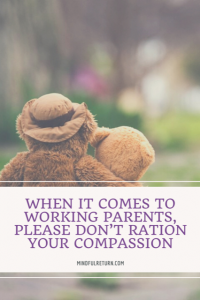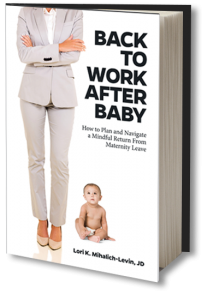 Have we reached the limits on how much compassion we can have for working parents right now? Gosh, I hope not. But sometimes it feels to me like we’re treating compassion as a finite resource.
Have we reached the limits on how much compassion we can have for working parents right now? Gosh, I hope not. But sometimes it feels to me like we’re treating compassion as a finite resource.
What exactly do I mean?
If you’re anything like me, your internal dialog lately has gone something like: “I just let myself off the hook last week on that project. I can’t give myself a pass on it again.”
Or, “I’ve already rescheduled on that person twice because of daycare closures and being sick. I don’t feel well today. But I’m going to keep the call on my calendar, because it wouldn’t be right to reschedule it again.”
Or, toward our children: “You were already home for 10 days under quarantine. I can’t possibly keep you home from school again, even though you have a cough.” (Except that because it’s COVID, we did keep him home…)
And when it comes to employers, many working parents get the sense that the reservoir of compassion has run dry. “I’ve been cutting you a break for two years now,” we hear. “Can’t you just get back to ‘normal’ in your role already?” Or “how much longer am I going to have to say ‘fine, just take care of your family first?’”
The Lawyer and Her Definitions
Yeah, yeah. Here it comes. If you’ve been reading this blog for a while, you know I’m big on being specific about the words I use. I like checking out the definition of a word to understand the concept better, before using it. (Cases in point: my posts on boundary-setting, mantras, and “abandoning” our children by going to work.)
Today, the two words I feel the need to share definitions of are (1) compassion; and (2) ration:
- Compassion: literally, “to suffer together”; the feeling that arises in witnessing another’s suffering and that motivates a subsequent desire to help.
- Ration: to use sparingly; to allow people only a fixed amount of something.
That “compassion” and “ration” happen to rhyme gives the title of this post a nice ring to it. But in all seriousness, I do think we’re pairing them in a really harmful way.
Also, for good measure, I’ll also throw into this definition section one more word I think we need to focus more on:
- Self-Compassion: a self-attitude that involves treating oneself with warmth and understanding in difficult times and recognizing that making mistakes is part of being human. (Neff, 2003)
Kristin Neff, recognized expert on self-compassion, found that there are three components to self-compassion: (1) being kind and understanding toward oneself rather than being self-critical; (2) seeing one’s fallibility as part of the larger human condition and experience rather than as isolating; and (3) holding one’s painful thoughts and feelings in mindful awareness rather than avoiding them or over-identifying with them. (Barnard & Curry, 2011)
How much self-compassion have you felt this past week? And would it be possible to feel more?

Let’s Unite and Stop Rationing Compassion
Intellectually, we know that compassion doesn’t get sold by the unit. That there’s not a finite underground lake of it that may one day dry up. And yet, so often, we treat it as though we can only “spend” so much of it. Just like love, perhaps. We know there’s an infinite amount. And yet siblings still fight over their parents’ love.
So for starters, let’s remind ourselves that we actually can’t run out of compassion. And that showing compassion for someone else or for ourselves last week, doesn’t preclude doing the same thing today.
But you might be asking (or arguing!): practically speaking, isn’t there such a thing as “too much” in the compassion department? I mean, the work *does* have to get done. And our kids do just have to go to school, and all that, right?
Yes, I hear you. But consider the situation we’re in right now as humans, and as parents. If there’s such a thing as “too much compassion” in this moment, then in my book, there must also be such a thing as “too much pandemic.” “Too much quarantine.” “Too much illness.” “Too much anxiety.” And “too much depression.”
If you’re going to tell me that you’re out of compassion, please also tell me how you plan to fix the other “too muches” that are happening.
Better Thoughts, Better Words
Pretend you’re with me, and you are willing to join Team “No-Such-Thing-as-Too-Much-Compassion.” What might some dialog re-frames look like?
To yourself, it may be, “I needed to let myself off the hook last week. And this week has been just as hard. I commit to doing this project when I am feeling better.”
With respect to that colleague you’ve repeatedly canceled on, it may be, “That I’ve canceled on her previously doesn’t have anything to do with the fact that I am sick today. I can reaffirm my commitment to her while rescheduling again.”
To our children, we can say, “It’s a pandemic. And while I hate that you are missing school, I really want you to stay home and feel better. We also care about making sure your classmates don’t get sick.”
And finally, if you’re in a leadership position within a company, it can be a loud and clear, “You should always take care of your and your family’s health first. Pandemic or no pandemic. There is no limit on when that should be the priority. Covid has been long, and dreadful, and I know you are struggling. I also trust you to resume your work commitments when you are able to.”
Imagine a world in which a compassion abundance mindset were the norm. How much better we’d all sleep at night, were this so.
Want more practical tips on working parenthood? Check out my book, Back to Work After Baby: How to Plan and Navigate a Mindful Return from Maternity Leave



Lori this post hit home. After two years WFH, my company is going back to the office. However, as a mom of two kids too young to be vaccinated, not much has changed for me but the thought of asking for an extended WFH until my kids are eligible for vaccination and/or the rolling school/daycare closures stop feels like asking for too much “compassion”.
So glad it resonated, Evette, and I hear you. I think it’s time to revise that thinking, though. Just because it’s been a long time doesn’t mean conditions are better for us yet. Hoping you’re able to ask for what you need, mama.